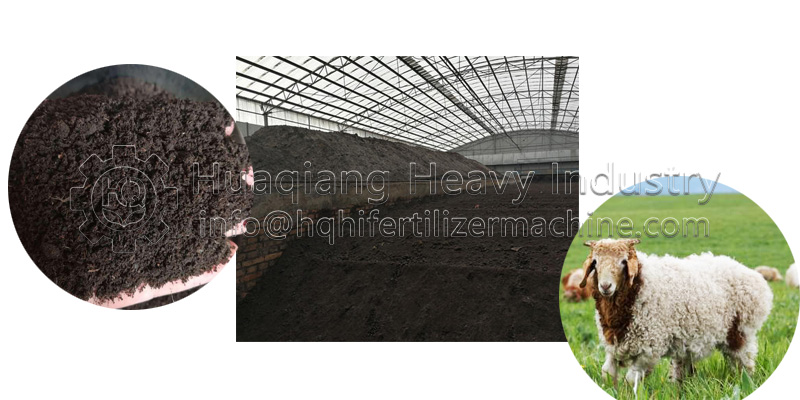There are many hazards in the direct use of sheep manure without fermentation treatment, which are shown in the following aspects:
1. Infectious diseases and insect pests. Feces contain coliform, nematode and other pathogens and pests. Direct use of feces leads to the spread of pests and diseases, crop diseases, and also has an impact on the human health of agricultural products; when immature organic substances are fermented in the soil, it is easy to breed pathogens and pests, which also leads to the occurrence of plant pests and diseases.
2. Ferment and burn the seedlings. If the fermentation site is close to the root and the plant is small, the heat produced by fermentation will affect the growth of the crop, and even cause the death of the plant.
3. Toxic gas hazard. In the process of decomposition, harmful gases such as methane and ammonia are produced, causing acid damage and root damage to soil and crops.
The soil is lack of oxygen. During the decomposition of organic matter, the oxygen in the soil is consumed, which makes the soil temporarily in the state of anoxia, which will inhibit the growth of crops.
The fertilizer effect was slow. Most of the nutrients in the unfermented and rotten organic fertilizers are organic or slow effect, which can not be directly absorbed and utilized by crops. Only when they are decomposed into quick effect, can they be absorbed and utilized by crops. Therefore, direct application without fermentation can slow down the fertilizer effect.
6 environmental pollution. The farm uses direct application method to absorb manure, and the manure can be disposed at the peak of crop fertilization; in the off-season of fertilization, no one cares about the manure, so we have to allow it to accumulate, wind and rain, loss of fertilizer efficiency, pollution of the environment and groundwater resources.
7. Inconvenient use and low efficiency. Untreated feces are difficult to transport, large in volume, low in effective ingredients and high in use cost. The transformation time of organic matter to humus is long, and the nutrient loss is serious.
Fermentation method of sheep manure:
1. The amount of sheep manure mixed with a certain amount of straw powder depends on the water content of sheep manure. Generally, 45% of the water content is required for fermentation, that is to say, the mixture is kneaded into a ball by hand, and the water can be seen through the fingers, but no water can be dripping, and it will be dispersed once the solution is released.
2. Then, according to the proportion of 1 ton of raw material (about 1.5 tons of fresh material) and 3 kg of raw biological compound bacteria solution, dilute the bacteria solution and water at the proportion of 1:300, spray them evenly into the material pile, mix and ferment. Adding a proper amount of corn flour can provide sugar for the fermentation of bacteria, which makes the multi-dimensional complex enzyme bacteria quickly take the absolute advantage.
3. Add the prepared mixture into the mixer or other
fertilizer equipment for mixing, and make sure that the mixture is even, transparent and free of lumps.
4. The stirred ingredients are piled into long strips between 2.0m-3.0m wide and 1.5m-2.0m high (the fermentation effect of the pile with a length of more than 3m is better), which are turned over and thrown once every 3 days with a turning machine.
5. Heaped for 3 days, odorless for 5 days, loose for 9 days, fragrant for 12 days and fat for 15 days. On the third day of composting, the temperature can reach 60 ℃ - 80 ℃, killing diseases and insect pests such as E.coli and eggs; on the fifth day, the odor of sheep manure is eliminated; on the ninth day, the compost becomes loose and dry, full of white hyphae; on the twelfth day, it sends out a kind of distiller's yeast flavor; on the 15th day, the compost is fermented and matured.
The whole fermentation
organic fertilizer production line needs 7-10 days to complete. The finished organic fertilizer is fluffy, dark brown, with wine flavor or soil flavor, rich in nutrients, and nutritious soil for fruits, vegetables, cash crops and seedlings.

